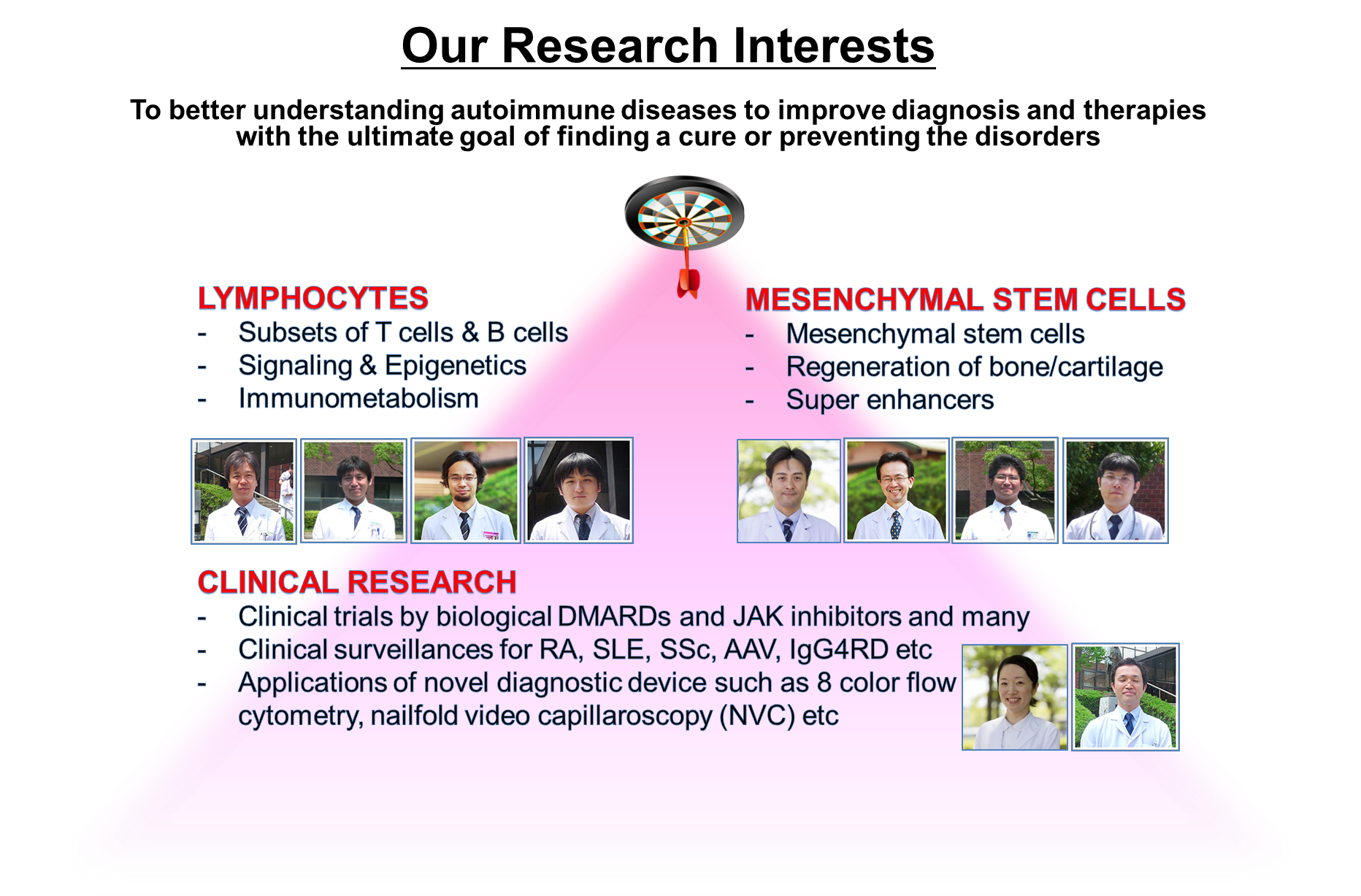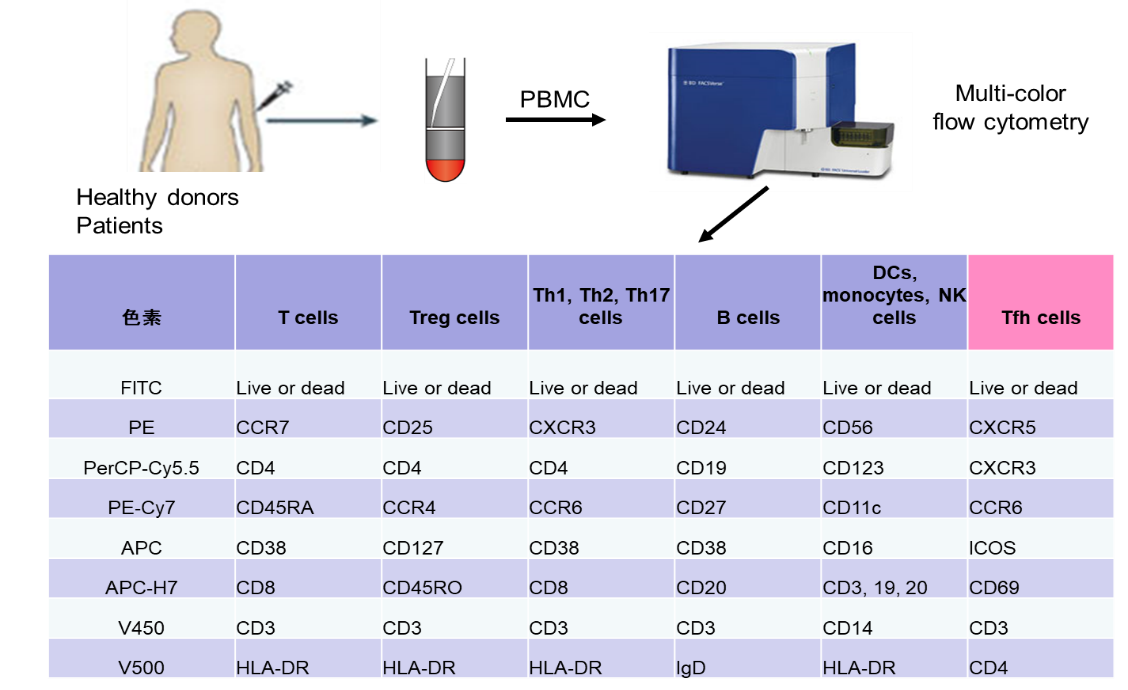1) About our department
The first department of internal medicine in the University of Occupational and Environmental Health, Japan (UOEH) has continued the tradition of excellence, with faculty members developing new therapies, offering state-of-the-art care, transforming rheumatology education, and leading national and international organizations. The “bidirectional translation between bench and bedside” model has been the philosophy of the department, where research ideas are spurred by clinical experiences, and where findings translate into improved treatments and best practices. Thus, the department has worked as “The Center of Excellence for Rheumatology and Clinical Immunology, West Japan”, in order to improve coordination of patient care, education, and research.The faculty members are involved in both clinical and basic research in rheumatoid arthritis (RA), systemic lupus erythematosus (SLE), vasculitis, scleroderma, etc. We are committed to a mission of providing the highest quality care for patients and training students, residents, fellows and young faculty. Our research programs are centered in the clinical areas and include the disciplines of clinical examination and laboratory research and collaborative efforts with other national and international organizations. The patients, payers, employers, participating physicians and institution largely benefit from our mission. Also, as a dean of graduate school we have educated many students from APLAR area to get a PhD degree of medical science in the university.
The department has several specialty centers of excellence.
- Patient care: To intensively expand clinical trials of biological DMARDs and kinase inhibitors for rheumatic diseases from our specialty network to the institutions.
- Research: To support local physicians in their understanding of the best research and best strategic approaches to autoimmune diseases and be involved in establishing APLAR guidelines. Translational research is one of our ultimate goal.
- Education: To provide training to young rheumatologists, scientists, rheumatology nurse or allied health professionals within the APLAR region using its Fellowship program. It is possible to get a PhD degree of medical science in the graduate school.
2) Organisational structure of the department

- In the Department, 13 faculty members (all are certified rheumatologists in JCR) conduct clinical and basic research. 4 core faculty, 9 young faculty, and 10 fellows are involved in clinical research works and 4 core faculty, 9 young faculty, 2 fellows and 18 post-doctoral PhD course students are involved in basic research works. We manage outpatient clinic (23 booths) and inpatients clinic (45 beds) devoted to all types of rheumatic and autoimmune diseases and musculoskeletal disorders.
- In the institution tight collaboration with metabolic medicine, multiple basic research departments attend our basic research. In the tight collaboration with dermatology, respiratory, cardiology, hematology, renal, neurological, metabolic and digestive medicine and orthopedic surgery attend our clinic. The clinical trial center in the hospital intensively attends and manages clinical research.
- Our local COE network consists of 10 specialty centers, which allows patients have most appropriate clinical setting for their illness.
- Our department is the center for COE of “AI-West J” network with 14 institutes including universities in the West Japan area for the clinical trials and doctor-oriented clinical studies.
- Currently 8 international students (5 China, 1 Korea, 1 Kazakhstan, 1 Vietnam) are enrolled in our Ph.D. program in this department. By every year, around 2 have obtained admission as the fully supported initiative students and got a PhD degree of medicine.
- We have 4 laboratory spaces including a RI center and an animal center, close to hospital either for basic research or for analysis of patient samples. Each graduate student has at least one basic and clinical research theme related to rheumatology, clinical immunology and regeneration. Each theme is pursued with a team of a staff and a graduate student. Some clinical trials oriented by our department are performed by the investigators team including faculties, graduate students, research nurses or technicians.
3) Research

Basic Research: Our basic research initiatives are aimed at unlocking the mechanisms of autoimmunity in order to create more effective treatments and therapies. The followings are major theme.
- Phenotypic analysis of lymphocytes to clarify disease mechanisms and to approach to precision medicine in rheumatic/autoimmune diseases in FLOW registry and LOOPS registry
- Studies on signaling mechanisms such as JAK/STAT, SYK, BTK in immune cells to clarify disease mechanisms and to develop pivotal translational research in rheumatic/autoimmune diseases (We have clarified pathological relevance of several kinases such as JAK, SYK and BTK in B cells, T cells and their subsets to RA and SLE and are currently screening small molecules for the clinical development by collaboration with several companies).
- Regeneration research using mesenchymal stem cells to approach to repair joints and other organs (We have established joint repair using human mesenchymal stem cells and nanofiber scaffold in animal model by collaboration with a company and are currently planning the pre-clinical study).
- Studies on dynamism of DNA methylation in RA-FLS.
- Studies on metabolic reprograming in T cells and B cells in autoimmune diseases.
- Postmarketing surveillance in patients with rheumatic diseases to estimate safety and efficacy of biological DMARD or JAK inhibitors in FIRST registry.
- We participate FIRST registry (>3000 RA patients treated with biological), CORRONA registry (USA), LNTN (international lupus nephritis in EU) and many.
- Clinical trials and translational medicine for the development of new treatment strategies in rheumatic/autoimmune diseases.
- On-going clinical trials with pharmaceutical companies on May 2018.
We have conducted or have been involved in many global and clinical trials at different phases of biologicals and kinase inhibitors for the treatment of RA, SLE and other autoimmune diseases and 15 papers have been published in the Annals of Rheumatic Diseases, 2 in the Lancet and 1 in the New England Journal of Medicine as a co-author (Tanaka Y) these 3 years.
Anti-CD40 Ab (BI655064), calcineurin inhibitor (AUR-VCS-2016-01) for lupus nephritis, BTK inhibitor (Voclosporin), anti-interferon alpha receptor Ab (Anifrolumab) for SLE, CTLA4-Ig (Abatacept) for RA, IIM and primary Sjogren syndrome, Anti-IL17A Ab (Secukinumab) for SpA, IV-IG (GGS) for MPA, PDE4 inhibitor (Apremilast) for Behcet disease, JAK1 inhibitor (Upadacitinib) for PsA and AS, JAK1 inhibitor (Filgotinib) for RA, anti-fractalkine Ab (E6011) for RA, BTK inhibitor (18K-MC-JPDA) for RA. - On-going faculties initiated clinical trials (Intervention) on May 2018
- Research for establishment and validation of therapeutic guideline aiming at "treatment holiday" in rheumatoid arthritis (Free-J study)
- The efficacy and safety of belimumab in the maintenance therapy for patients with SLE (BLISS-post study).
- On-going faculties initiated clinical trials (Observation) on May 2018
- Anti-TNF-Study Utilizing Biomarker Assay to Monitor Early Response to Certolizumab Pegol (TSUMAME study).
- fficacy of Denosumab about dual-energy X ray absorptiometry compared with Alendronate in Glucocorticoid-induced Osteoporosis patients (DEXA-GO study).
- The multicenter trial in the efficacy and safety in de-escalation treatment with tofacitinib for patients with RA (XANADU study)
- The efficacy and safety in de-escalation treatment with baricitinib for patients with RA (XANADU-B study)
- The comprehensive analysis by nailfold videocapillaroscopy (NVC) and peripheral immunophenotyping for patients with SSc (SCORPION study)

4) Patient care
This faculty is only ONE COE in the West Japan, developing cutting edge therapies, offering state-of-the-art care, transforming rheumatology education and leading national organizations. The faculty members are committed to a mission of providing the highest quality care for patients with RA, SLE, vasculitis, systemic sclerosis (SSc), etc. through multidisciplinary approach to diagnose and manage patients with the goal of improving the lives of patients. We routinely adopt guidelines for diagnosis, treatment strategy and patient care published from ACR, APLAR, EULAR and/or JCR.In our department, we have 23 booths in outpatient clinic and 45 beds for the inpatient clinic for all types of rheumatic and autoimmune diseases and musculoskeletal disorders.
Outpatient clinic: Outpatient clinic: 2630 patients with RA, 816 patients with SLE, 1048 Sjogren syndrome, 331 SSc, 256 MCTD, 218 vasculitis syndrome, 192 PM/DM and many others visit our department in 2017. 90% of them have referrals from other hospitals or clinics. Inpatient clinic: RA 317, SLE 76, vasculitis 62, systemic sclerosis 39, polymyositis/dermatomyositis 30, Sjogren 11, Bechet 19 and the more than 100 types of related disorders per 1 year (2017). The vast majority of RA patients admitted for clinical trials or clinical studies.Almost all the patients are Japanese.
We have a patient-centered care model. In the clinical path model, at least following five issues are routinely promised in each patient:
- patient education,
- patient involvement/shared decision-making,
- patient empowerment/self-management,
- involvement of family and friends,
- physical and emotional support.
5) Education and Training
The faculty is designed to train rheumatology specialists who will provide expert medical care for patients with rheumatic disorders and can serve as consultants, educators, and physician scientists leading national and international organizations. The bidirectional translation between bench and bedside model has been the philosophy of the department, where research ideas are spurred by clinical experiences, and where findings translate into improved treatments and best practices. We emphasize how to effectively diagnose and treat patients and the importance of patient-centered policy in research as well as clinic. We will provide training to young rheumatologists, scientists, rheumatology nurse or allied health professionals within the APLAR region using its Fellowship program.In the Department, 15 faculty members (all are certified rheumatologists in JCR) conduct clinical and basic research. 10 fellows and 18 post-doctoral PhD course students are involved in training areas/research areas of basic and clinical research works. The number of the graduates is 26 in the past 10 years. The faculty will provide an environment of inquiry and scholarship as well as clinical discussions, rounds, journal clubs, and research conferences to support residents participation in scholarly activities. The training program is designed to produce rheumatologists who will be successful in all fields, whether in private practice, as academic clinician educators, or as physician-scientists.
The standard period of attendance at the Graduate School of Medicine is 4 years, during which the students belong to a department and acquire research ability as an expert under the supervision of the professor. When they earn the specified credits and complete a thesis that passes examination, they complete graduate school, and are granted a degree (PhD).
We have received Grant-In-Aid for Scientific Research from the Ministry of Health, Labor and Welfare of Japan, the Ministry of Education, Culture, Sports, Science and Technology of Japan, Japan Agency for Medical Research and Development (AMED), and the University of Occupational and Environmental Health, Japan (UOEH). If Asia International Educational Program for Graduate Students in the Field of the university is obtained, tuition fees and rental house fee are exempted and monthly scholarship are provided. (link here)

6) Awards
1999: Academic award, Japanese Society of Inflammation and Regeneration2003: Academic award, Japanese Society of Bone and Mineral Research
2008: President award, Japanese College of Rheumatology (JCR)
2009, 2010, 2013, 2018: Award, European League against Rheumatism (EULAR)
In the past 10 years, five researchers have won the EULAR award
2013: Visiting Professorship in Karolinska Institute (Sweden)
2015: Henoch award in Erlangen University (Germany)
Endorsement and certification for the application was received from Japan College of Rheumatology
7) Publications
Link [PDF]8) List local or international funding to the Center
Link [Japanese]9) Contact Information
| Name of Center: | |
|---|---|
| University of Occupational and Environmental Health, Japan (UOEH) | |
|
Main address:
The first department of internal medicine, School of Medicine, University of Occupational and Environmental Health, Japan (UOEH) 1-1, Iseigaoka, Kitakyushu, 807-8555, Japan |
|
| Tel no: +81-93-603-1611 | Fax no: +81-93-691-9334 |
| Website: http://www.uoeh-u.ac.jp/kouza/1nai/intro_j.html |
Email address: tanaka@med.uoeh-u.ac.jp |
| Head of Center | |
| Name: Yoshiya Tanaka, MD, PhD | |
|
Job title: Professor and Chairman, Department of Internal Medicine Dean, Graduate School of Medical Science | |
Last update: 9th Feb, 2019
Copyright 2018 The first department of internal medicine, University of Occupational and Environmental Health, Japan

